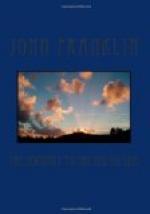On the morning of the 6th we embarked and descended a series of rapids, having twice unloaded the canoes where the water was shallow. After passing the mouth of the Fairy Lake River* the rapids ceased. The main stream was then about three hundred yards wide and generally deep, though in one part the channel was interrupted by several sandy banks and low alluvial islands covered with willows. It flows between banks of sand thinly wooded and as we advanced the barren hills approached the water’s edge.
(Footnote. This is an Indian name. The Northern Indian fairies are six inches high, lead a life similar to the Indians, and are excellent hunters. Those who have had the good fortune to fall in with their tiny encampments have been kindly treated and regaled on venison. We did not learn with certainty whether the existence of these delightful creatures is known from Indian tradition or whether the Indians own their knowledge of them to their intercourse with the traders, but think the former probable.)
At ten we rejoined our hunters who had killed a deer and halted to breakfast. We sent them forward; one of them who was walking along the shore afterwards fired upon two brown bears and wounded one of them, which instantly turned and pursued him. His companions in the canoes put ashore to his assistance but did not succeed in killing the bears, which fled upon the reinforcement coming up. During the delay thus occasioned we overtook them and they continued with us the rest of the day.
We encamped at the foot of a lofty range of mountains which appear to be from twelve to fifteen hundred feet high; they are in general round-backed but the outline is not even, being interrupted by craggy conical eminences. This is the first ridge of hills we have seen in this country that deserves the appellation of a mountain range; it is probably a continuation of the Stony Mountains crossed by Hearne. Many plants appeared in full flower near the tents and Dr. Richardson gathered some high up on the hills. The distance we made today was fifty miles.
There was a hoar frost in the night and the temperature at four next morning was 40 degrees: embarking at that hour we glided quickly down the stream and by seven arrived at the Hook’s encampment which was placed on the summit of a lofty sand cliff whose base was washed by the river. This chief had with him only three hunters and a few old men and their families, the rest of the band having remained at their snares in Bear Lake. His brother Long-legs and our guide Keskarrah, who had joined him three days before, had communicated to him our want of provision, and we were happy to find that, departing from the general practice of Indian chiefs, he entered at once upon the business without making a long speech. As an introductory mark of our regard I decorated him with a medal similar to those which had been given to the other leaders. The Hook began by stating




